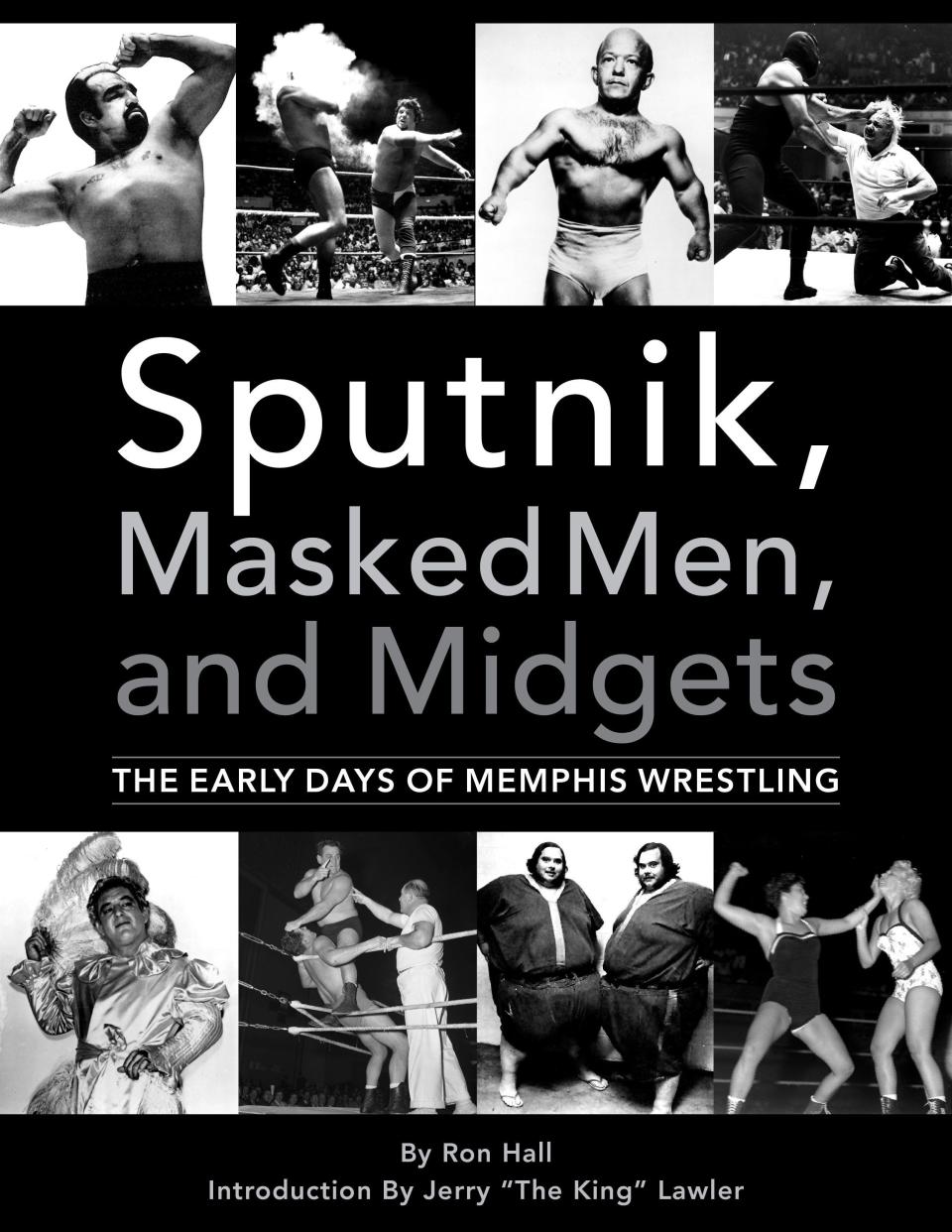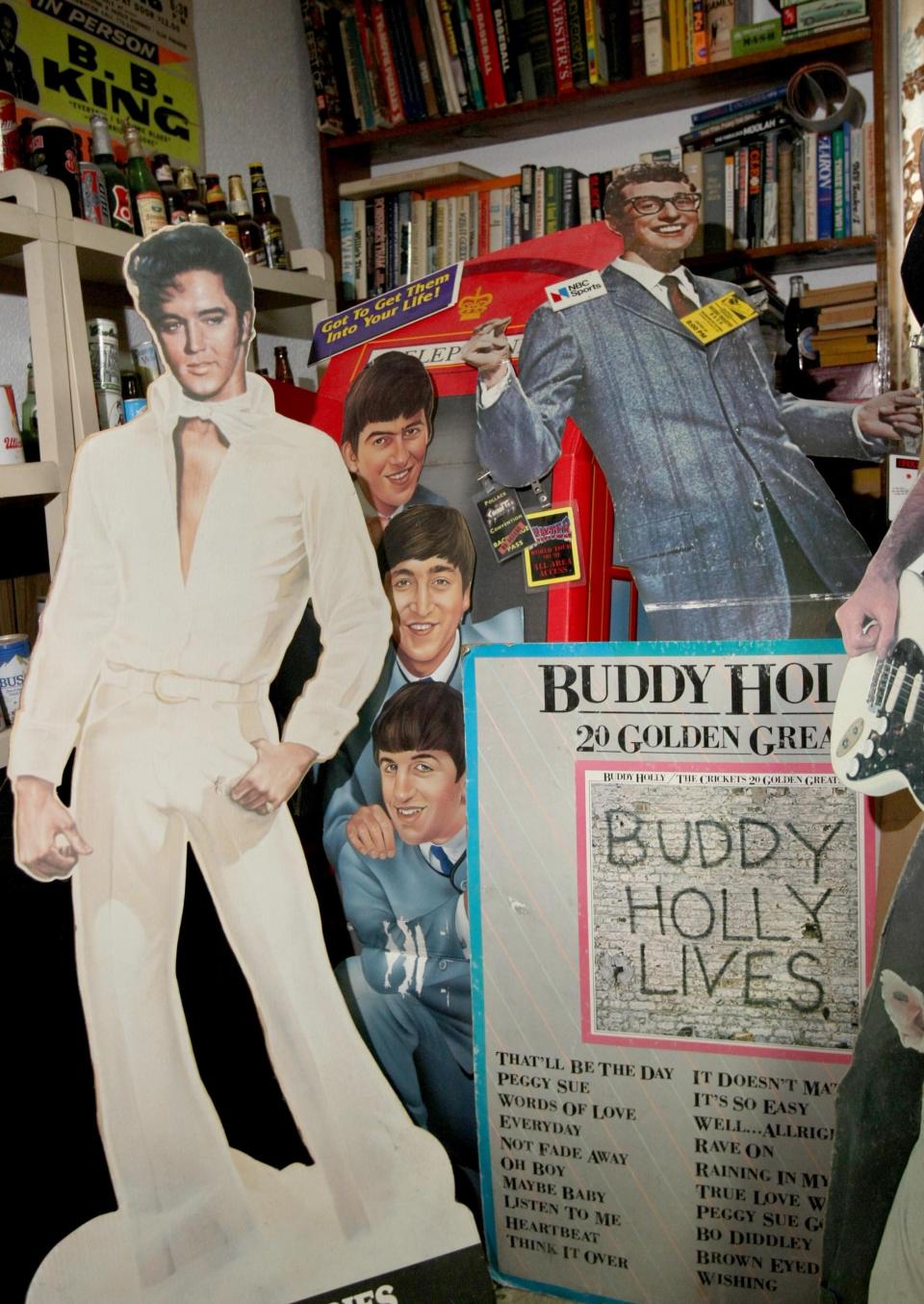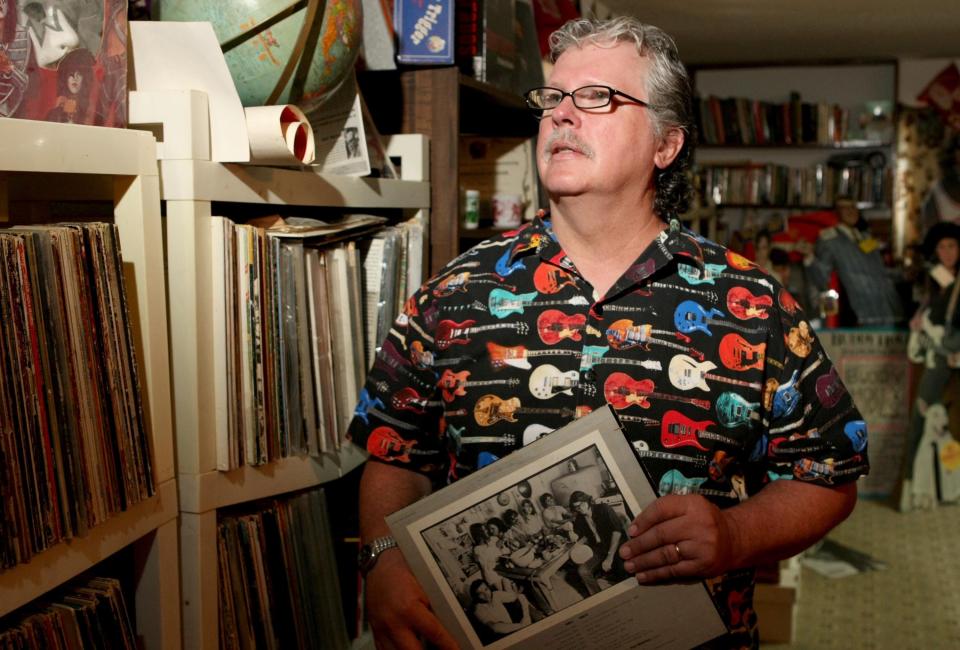Ron Hall, historian of Memphis rock, wrestling and pop culture, has died at 73
- Oops!Something went wrong.Please try again later.
With a fan's passion and a historian's integrity, Memphis writer and researcher Ron Hall championed and chronicled the garage bands, rock 'n' roll stars, TV wrestlers and other uncompromising artists, innovators, oddballs and eccentrics who put his longtime hometown on the pop culture map in the years after the Elvis explosion.
From his youth until his death Tuesday night at the age of 73, Hall never lost his enthusiasm for Memphis nor disavowed the exhilaration of attending garage rock concerts at the old Frayser Skateland and playing with his own teen band, the 13th Muse, at such unlikely venues as a home for unwed mothers in Oakhaven.
Hall was an unpretentious multi-hyphenate whose résumé represented a roll call of dream jobs for a Baby Boomer in Memphis in the years when drive-ins, television dance parties, Overton Park Shell rock concerts and pop-rock radio were ascendant.

He drove a popsicle truck. He was "engineer" on the kiddie train at the Memphis Zoo. He played in teen rock bands. He booked concerts, bringing Brownsville Station ("Smokin' in the Boys Room"), the Steve Miller Band (about to be hot with "The Joker") and a young banjo-strumming comic named Steve Martin to Memphis. He was a record distributor and radio deejay and record collector and avid concertgoer.
Finally, he helped immortalize his enthusiasms via CD anthologies, a motion picture documentary, a radio program and a series of painstakingly researched and lavishly illustrated books that presented definitive histories of the Memphis rock concert scene, the "garage" and "frat bands" of the 1960s and '70s, and the classic era of Memphis professional wrestling.
"This is when Memphis ruled!" Hall would write, when he autographed copies of his 2009 book, "Sputnik, Masked Men and Midgets: The Early Days of Memphis Wrestling." The book was a precursor to a successful 2011 feature documentary, "Memphis Heat: The True Story of Memphis Wrasslin'," on which Hall was an executive producer alongside Sherman Willmott, whose Shangri-la Projects imprint issued the film and Hall's books.

"Ron was a savant in shining a light on what it meant to grow up smack in the middle of the post-war pop culture explosion in one of the most influential music and professional wrestling cities in the world," Willmott said. “Ron had an amazing knack of finding and breaking down the essence of what people were really fascinated with in Memphis’ wild and woolly past."
Hall died Tuesday, surrounded by his family, after time spent in hospice. The news was not unexpected but nevertheless was extremely upsetting for a tightknit yet international community of Memphis pop-culture connoisseurs.
"We're all on detective missions in search of good music, and curiosity is a driving force," said Zac Ives, co-owner of Goner Records, the Cooper-Young based shop that affirms Hall's ethos through its record label and annual Gonerfest concert weekend. "Ron was always so generous with information and so passionate, it was infectious."
"We were always inspired by Ron's passion for Memphis music and bringing noteworthy musicians out of obscurity," said Goner founder Eric Friedl, who wrote liner notes for a CD compilation that was a companion to Hall's 2001 book, "Playing for a Piece of the Door: A History of Garage & Frat Bands in Memphis 1960-1975," and the book's sequel, "The Memphis Garage Rock Scrapbook."
"It's something Ron shared and we share with Shangri-la and all the record stores," Friedl said "We just want to turn people onto good stuff."
Sometimes, Hall opened his East Memphis home to visitors, who marveled over his vast store of paradoxically timeless pop culture ephemera and his hundreds and hundreds of record albums. According to a 2008 story in The Commercial Appeal, Hall had 2,000 albums in his "personal collection," with another 10,000 or so in storage, to sell to collectors or at the Memphis Flea Market, where he maintained a booth for 38 years.
In the introduction to his scrapbook-style 2014 book "Memphis Rocks: A Concert History 1955-1985," Hall traced his live-music enthusiasm to a 1968 concert by the Scottish folk-rock artist Donovan at Downtown's old Ellis Auditorium. Wrote Hall: "Even though Donovan sat on a bed of flowers while he did his set, I was hooked."
As a sometimes ponytailed young enthusiast, Hall turned being "hooked" into a fulltime avocation. He worked in rock music from all sides, as a musician in teen clubs, as a promoter, as a record sales associate, even as a chauffeur for the New York Dolls in 1973, when the glam-rock band opened for Iggy Pop & the Stooges at the Auditorium South Hall (ticket price: $6 at the door).
But his most significant contribution to Memphis arguably occurred decades after the rock 'n' roll heyday, when he became a tireless evangelist of local music and culture, sharing his passion through various projects and on "The Roaring Sixties," a program he hosted on the Memphis Public Library's radio station, WYPL-FM 89.3.
Like the Shangri-la books and CD anthologies, Hall's radio show show celebrated and renewed interest in such Mid-South garage and frat bands as the Guilloteens, Flash & the Casuals, Randy & the Radiants and the Breakers, whose largely forgotten 45 rpm singles and TV "Talent Party" appearances merged Sun Records zeal and Memphis soul-blues energy with British Invasion experimentation, providing a direct antecedent to the punk fearlessness exemplified by such later bands as Tav Falco's Panther Burns and the Oblivians.
"I've got an album by the group Tight Little Unit that they cut in a roller rink in Millington," Hall told The Commercial Appeal. "They couldn't have pressed many, probably 300 to 400."
"Ron's work really fleshed out Memphis' musical history," said author and filmmaker Robert Gordon, whose influential 1995 book, "It Came from Memphis," covers some of the same territory, in narrative form. "Though I was familiar with a good number of the tracks, those CDs were eye-opening to me."

Gordon said the "scrapbook" style of some of the books — a design format that reproduced newspaper ads for Black Sabbath at Ellis Auditorium, snapshots of Tom Waits at The Ritz on Madison, publicity portraits of Sputnik Monroe, and so on — "elevated the mundane."
"The way Ron pooled that collection of ticket stubs, advertisements and all kinds of memorabilia really tied together a lot of pieces and, perhaps most importantly, trained our eyes to really distinguish what's special all around us all the time," Gordon said.
The son of a Naval Chief Petty Officer, Hall was born in Long Beach, California. He spent his earliest years on various Navy bases until he was 10, when his family settled in the Memphis neighborhood of Frayser, when his father was assigned to the Memphis Naval Air Station at Millington.
Hall's first enthusiasm was for sports, specifically the New York Yankees. He became a baseball card collector and also an avid fan of the then-Memphis State Tigers and the Dallas Cowboys. (As an adult, he coached and played for 30 years on a city league softball team, the Dixie Diamonds.)

Hall formed 13th Muse while at Frayser High School (he graduated from the school in 1968). He and his friends also formed a concert promotions company, Third World Productions. He worked in record distribution for Record Sales in Memphis and later for Stan’s Record Distributors in Louisiana, but earned a living for most of his life not through music but as an employee of the U.S. Postal Service. He retired in 2017 after 34 years with the post office.
Hall met his wife, Sue Valle Hall, in 1979. According to Sue Hall, her future husband's first words to her were: “I’m in love and I’m going to marry you!” The Halls would have celebrated their 43rd anniversary this month.
Ron Hall also leaves three sons, Dustin, Nicholas and Stephen, all of Memphis; a brother, Larry Hall, of Memphis; and four grandchildren.
In 1995, Hall converted to Catholicism. He was an active member of St. Paul the Apostle Catholic Church. A funeral mass for Hall will be at the church at noon Monday, March 11, with visitation starting at 10 a.m. Burial will follow the service at Calvary Cemetery. Canale Funeral Directors has charge.
The family requests memorials be made to the church's Mother Cabrini Circle.
This article originally appeared on Memphis Commercial Appeal: Ron Hall, historian of Memphis rock, wrestling & pop culture, has died

